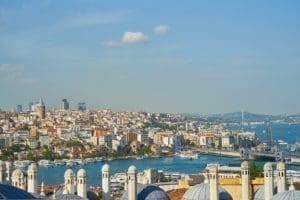Portuguese Passport – The Most Comprehensive Guide
This article contains the most comprehensive explanation written online on the eligibility and process of obtaining Portuguese passport and citizenship as a descendant of the Sephardi Jewish community. Everything relating to the legal procedures of acquiring the passport is written here, as well as the historical background of those who were expelled from Spain to different countries. All of the countries shall be listed, as well as the Sephardic surnames, and much more. This article is the fruit of much research that was done by our office for almost a year. The goal is to reveal the Sephardic Jewish connection that exists in almost every Jewish community around the world.
The results of the research may surprise you because, among other things, it indicates countries that seem to have no Spanish connection, such as: Iraq, Poland, Iran, Uzbekistan (Bukhara), Yemen, Ukraine, and others. In actuality, we found deep Spanish connections even within these countries. In case before reading this article, you are fairly certain that you are not eligible for a Portuguese passport, and then afterwards it seems that you are indeed potentially eligible, we would be happy to be in contact with you.
Portuguese Passport Lawyer
Our law office specializes in obtaining Portuguese citizenship. We have already found Sephardic roots in many Jews from Middle Eastern countries, the Balkans, Asia, Europe, and the Americas, as well as in non-Jews who bear a Sephardic connection in their family from many generations past.
Table of Contents for Portuguese Passport – The Most Comprehensive Guide
Introduction – Law of Return to Portugal for Descendants of Expelled Jews Enacted in 2015
 At the beginning of 2015 the Portuguese government established a law of return for descendants of those expelled from Spain and Portugal. The law recognizes the terrible historical injustice that befell the Jews of Portugal in the year 1497, and grants their descendants the right to petition and receive a Portuguese passport. In addition, the new legislation makes the procedures for receiving citizenship much easier for anyone who is able to prove that they are descended from Jews expelled from Spain or Portugal, whether that person is Jewish or non-Jewish.
At the beginning of 2015 the Portuguese government established a law of return for descendants of those expelled from Spain and Portugal. The law recognizes the terrible historical injustice that befell the Jews of Portugal in the year 1497, and grants their descendants the right to petition and receive a Portuguese passport. In addition, the new legislation makes the procedures for receiving citizenship much easier for anyone who is able to prove that they are descended from Jews expelled from Spain or Portugal, whether that person is Jewish or non-Jewish.
The law was enacted with historical consideration, primarily with the desire to repair the injustice committed in the past. On the other hand, the Portuguese legislature is aware that Israeli immigration is a high quality immigration that can contribute to the Portuguese economy.
This article will detail all legal content and procedures required to obtain Portuguese citizenship. This shall be done by showing one by one all the steps needed until citizenship is issued.
Who is the Portuguese Passport Intended for?
The Portuguese passport, as mentioned before, is intended for every Jew or non-Jew (for instance, the many Catholics who live in South America) who are able to prove that they are descendants from those expelled, or the Anusim, from Spain / Portugal. According to estimations, there are about 100 million eligible worldwide, most of whom live on the American continent. In Israel there are over 3 million who are eligible for a passport of Portugal according to this law.
If you think that you are eligible, you will need to provide a record from a genealogist (we can help you do that) that proves your family’s Sephardic connection. Additionally, in this guide we will list the required documents that you will need to provide. It is important to note that the authorities in Portugal do not require a genealogical record that goes back to 1492 – the year of the expulsion. The genealogical report needs to go back 3 or more generations (with as much detail as possible), basically proving the candidate’s Spanish / Portuguese cultural connection.

Historical Background of those Expelled from Spain and Portugal
On March 31, 1492 the “Alhambra Decree” was issued from the Alhambra Palace in Spain. The Alhambra Decree was the royal document that decreed the expulsion of all Jews from Spain until no later than July 31, 1492. The decree was put into motion, as the Spanish monarchy was aspiring to return to the origins of the ancient Catholic state with the “blue” Spanish blood.
The Jews constituted a large part of the Spanish State, as their numbers were said to be approximately 300,000 persons. A substantial portion of them were among the local aristocratic class, some of whom were ministers of the court in the royal palace, such as: Hasdai Ibn Shaprut, Rabbi Shmuel HaNagid, Yosef HaNagid, Abraham Senior, Rabbi Isaac Abravanel, and others.
Furthermore, another large portion of the Jews excelled specifically in the areas of study and science. Areas such as: mathematics, philosophy, language, astronomy, dialectics, medicine, religion, theology, and more. Among the names of the famous personalities from the Iberian Peninsula were: the Rambam (Maimonides), Rabbi Abraham Ibn-Ezra, the Ramban, Amatus Lusitanus (a well-renowned medical doctor and physician in Europe), Rabbi Joseph Karo, Solomon Bonfed (poet), and so on.
The Golden Age and the Spanish Expulsion
The Jewish Enlightenment (Haskalah) movement of the 18th century called this prosperous time period the “Golden Age of Spanish Jewry.” During this era, the Sephardic Jews from Spain led the halachic-rabbinical world, as well as contributed to the various scientific industries on the Iberian Peninsula in the areas of medicine, astronomy, literature, and philosophy, in which they prevailed within the advance Spanish state. However, as fate would have it, the Jews were chosen as the scapegoats by the surrounding monarchs.
After the expulsion an estimated 70,000 of the Jews of Spain emigrated to the neighboring country of Portugal. However, the Portuguese royal house also decided to remove the Jews from Portugal in 1497, only five years after the calamity that befell them in Spain. Thus, once again, about 100,000 more Jews were expelled from their country.
We can say that in Spain about 40% of the Jews converted to Christianity, tens of thousands of whom lived as Anusim (Marranos). Nevertheless, the majority of Jews chose to remain faithful to their religion and searched for a home, usually in Mediterranean countries, as well as in Europe, Asia, the Americas, and the far east.
To Which Countries did Those Jews expelled from Spain Migrate?
As a result of the two massive expulsions from Spain and Portugal, the Jews initially dispersed across the Mediterranean and especially the Ottoman Empire. The countries that absorbed the largest number of Jews were: Morocco, Algeria, Italy, and Tunisia. In these countries they numbered in the tens of thousands. At the same time, we can also find a relatively large number of Sephardim in Egypt and Libya.
In these countries the Sephardim founded “Spanish colonies” in new cities in which there was no Jewish settlement prior to their arrival (e.g. Tangiers, Tetouan, Livorno, etc.). The colonies contained impressive synagogues in new designs that were influenced by the Spanish Renaissance and the ancient Moorish architecture. Along with the synagogues, they established religious courts that strictly operated under Sephardic Jewish law, headed by the sages of the yeshivas in Toledo, Barcelona, Cordova, etc.
Today, the Jews of these countries (North Africa) are descendants of the great Spanish immigration that arrived at the end of the 15th century. Most of them (except a small fraction of the Jews of Tunisia) carry on the ancient Sephardic customs which the expelled Jews from Spain brought and zealously guarded.
Receiving Portuguese Citizenship Exclusively – Jews from the countries mentioned in this section are in the first category of eligibility for a Portuguese passport. This means that acquiring citizenship will be easier for them than for the rest of the candidates. This is because these countries are recognized by the Jewish communities in Portugal as “exclusively Sephardic countries.”
In addition, in some of these countries the Jews spoke a unique language called Haketia. Haketia was a Judeo-Spanish dialect (similar to Ladino) which the North African Jews customarily spoke to each other for many many years. The country in which this language was most widely spoken was Morocco.
If you can prove, through old documentation, that one of your ancestors spoke this language, there is a very high probability (almost certainty) that you are a direct descendant of Sephardim, and therefore eligible to receive a Portuguese passport.

Countries in the Ottoman Empire to which the Expelled Jews from Spain Emigrated
It is important to note that the majority of those expelled from Spain settled in regions belonging to the Ottoman Empire. In those years (between the 15th and 16th centuries) the Ottoman Empire stretched from North Africa to the Ukraine, from Italy to Iraq. Countries that were under the reign of the empire and that absorbed a large number of Jews expelled from Spain were: Turkey, Greece, Syria, Bulgaria, Romania, Lebanon, Bosnia (Sarajevo), Serbia (Belgrade), Israel, Macedonia, Albania, Croatia, Montenegro, and Kosovo. These Jews have Sephardic traditions that are hundreds of years old, such as: prayer, dress, cuisine, language (Ladino), burial ceremonies, and other Sephardic traditions. If you happen to come from one of these countries mentioned, it would appear that you are direct descendants of Sephardic Jews expelled from Spain, and therefore eligible for a Portuguese passport.
The Jews of most of these countries are also in the first category of those eligible for a Portuguese passport. For them, acquiring citizenship will be much easier compared to other applicants. This is also because most of these countries are recognized amongst the Jewish communities in Portugal as “Sephardic countries.” A prominent Spanish characteristic amongst Sephardic Jews who populated the Ottoman Empire is the use of the Ladino language.
Applicants who are able to prove that their ancestors spoke Ladino (through recordings or written documents) may almost certainly be assured of their eligibility for Portuguese citizenship. This is because the Ladino language, along with a family tree, constitute the most substantial evidence that you are Sephardic.
It is important to note that in the event that your family did not speak Ladino, this does not preclude you from receiving a Portuguese passport. This is because there are several indications that prove a Sephardic connection (as will be listed further on), and speaking Ladino is only one of them.
European Countries not Recognized in the Sephardic Community though Possessing Sephardic History
There are additional countries which the expelled from Spain went to in large numbers, but over the years the local Jews that lived alongside them outnumbered them. In most cases the Sephardim assimilated with the locals, but in more than a few cases the family memories remained, such as in documents, surnames, or traditions that bore witness to a Spanish past. These countries are Poland, Ukraine, Belarus, Moldova, Germany, Czechoslovakia, Hungary, Austria, Italy, Belgium, Great Britain (England), and France. Hundreds of Sephardic families came to most of these countries, and they were primarily engaged in trade. Amongst them were distinguished personalities and philanthropists who were usually close to the local nobility. Together with the aforementioned countries is Holland, in which the Spanish-Portuguese Anusim community flourished for centuries, until World War II.
Generally we all think that Spanish Jewry emigrated to Islamic countries that were more tolerant during the time of the expulsion. Yet this claim is far from being completely true. Sephardim went to countries like Holland and France, even 250 years after the expulsion. They arrived as Anusim after hundreds of years of secretly keeping the commandments in Spain and Portugal, risking their lives.
Quite a few famous Jews from European Jewry proudly boasted about their Spanish roots. Some of them include personalities such as: Binyamin Zeev (Theodor) Herzl, Karl Marx, Baruch Spinoza, Benjamin Disraeli, the Montefiore family, Michel de Montaigne, Enrico Macias, Jessica Alba, Benjamin Netanyahu, and others.

Additional Countries in the Middle East and Around the World Where the Jews Expelled from Spain Went
As mentioned, those expelled from Spain were usually part of the elite business and social class in the countries to which they went. They played a significant role in the international trade business from the 15th to the 18th centuries. In the ancient population registries and from written historical record, it is possible to see that the Jews expelled from Spain, or their direct descendants, came to conduct their transactions in distant countries where they remained, even up until the 20th century. A small number of them live in these countries even today. These countries are: India, Iran, Iraq, United States, Canada, Brazil, Uzbekistan (Bukhara), Mexico, Argentina, Australia, New Zealand, South Africa, Venezuela, Colombia, Jamaica, Cuba, Peru, Suriname, Guyana, French Guiana, Dominican Republic, Zimbabwe, Mozambique, and others. Apart from that, we must note that there is also a history of Portuguese Jewish traders in Yemen, which was after the Portuguese army took control of various port cities in the 16th century and developed trade within them.
Sephardic Surnames Identified Among Spanish and Mizrachi Jews
The Jews of Spain who dispersed to different countries after the Spanish expulsion tended to guard their traditions, and especially their surnames. Today there are many hundreds of Sephardic surnames among their descendants. These are among the many variety of names: Ohana, Azulay, Hayat, Verdugo, Biton, Moyal, Barzilai, Asayag, Halfon, Marciano, Dahan, Pinto, Suarez, Zeitoun, Nahmias, Abarbanel, Gabbai, Saragusti, Alkalai, Pardo, Hason, Benbenishty, Lugasi, Ben Basat, Ben Shoshan / Shoshan, Moreno, Partush / Sasportas / Saporta, Castro, Lahiani, Abulafia, Toledano, Abecassis, Montefiore, Laniado, and others.
Some of these names are often identified as names that are Moroccan, Algerian, and such. However, these names are more than a thousand years old and are also found within the ancient Spanish population registries. On our site there is an expansive list of names that was published by the Portuguese government. For information on the list, click on this link.
Sephardic Surnames Amongst Ashkenazi Jews – Portuguese Citizenship for Ashkenazim
The Jews expelled from Spain and their descendants also came to European (Ashkenazi) countries, as mentioned above, where they lived in the thousands. Some of the communities isolated themselves from the local Ashkenazi communities in countries such as: Holland, Germany (Hamburg), England, France, and so on. In contrast, some of the Sephardic communities, like in Eastern Europe, maintained the communities isolation for more or less 100 years; however, in the end, they assimilated into the local Ashkenazi communities, which happened in Poland, Ukraine, Austria, Hungary, and others. According the populations registries of these countries from the 16th century, one can see that the Sephardic immigrants changed their surnames to local Ashkenazi surnames, for instance: Horowitz, Skolnick, Altshuler, Epstein, Sprinzak, Frank, Abramowitz, and so on (for an expanded list of names click here).

Documents for Receiving a Recommendation Letter from the Jewish Community of Portugal
In order to receive a letter of recommendation that can serve as a formal confirmation that you are Spanish / Portuguese, you must submit the following documents:
- Birth Certificate
- Copy of ID with attachment
- Copy of Israeli Passport
- Copy of Marriage / Divorce Certificate; if the applicant is not married, then they must provide a copy of their parents’ certificate.
- Family Tree of the Applicant. A family tree must be shown, as detailed as possible. Details on the ancestors’ names, birth dates, marriage dates, etc. shall be provided. It should be clarified that family trees lacking information will most likely be refused (our office employs genealogists who can help you locate the Spanish roots in your family if there are any)
Receiving a Recommendation Letter – Who Gives the Recommendation and Who Receives it?
In order to begin the process of officially receiving Portuguese citizenship, the applicant must obtain a recommendation letter from one of the Jewish communities in Portugal. The process of obtaining a recommendation letter takes between one to two months.
Approval of the recommendation will be given if the applicant is recognized as a descendant of the Jews expelled from Spain. (For this process there is no need to submit a family tree going back to 1492, rather just dating back a few generations, as previously mentioned. Proof that the applicant’s ancestors prayed from a Sephardic siddur, had Sephardic traditions, or surnames, and so on, is demonstrated through the family tree).
The Jewish Communities in Portugal
In order to obtain a recommendation letter, one must turn to one of the two Jewish communities in Portugal, with which our office has excellent connections.
1. The Community in Porto – this community provides a recommendation letter only to descendants who were born to Jews in accordance with halachah (whether or not the applicant is Jewish but is a child of a Jewish mother or father).
- In order to obtain an approval for a recommendation, you must submit documents that attest to the Sephardic connection in your family. For example: surname, ketubah, Jewish burial registration, traditions, dress, language (such as Ladino), Sephardic cuisine, and so forth. You will also be asked to provide a family tree dating back 5-15 generations (depending on your country of origin).
2. The Community in Lisbon – it provides a recommendation letter to applicants who are not Jewish, but who are able to prove that they are descended from Jews expelled from, or lived as Anusim in, Spain. For example, many Christians and Catholics, particularly in South America, or even Muslims from North Africa.
The proof will be given similarly to what is written in the previous paragraph, although two key sections will be highlighted:
- A detailed family tree of the family ancestors must be shown
- There must be a genealogical description written about direct ancestors
The writing of the description shall be done by external authorities or a Sephardic rabbi that knows the applicant. The applicant must present in writing that his family possesses a Sephardic past and traditions.
3. The Community in Belmonte – this community has not yet been officially recognized by the Portuguese authorities. This is because it did not exist in 2015 – the year the Portuguese law of return came into effect.
The Stage after Obtaining the Recommendation – Documents Required for Receiving Portuguese Citizenship
After you obtained a recommendation letter from the Jewish community in Porto or Lisbon, you are officially eligible to receive a Portuguese passport. All that you have to do now is send the request, together with a number of other documents, to the Ministry of Interior in Portugal, for the purposes of obtaining a Portuguese birth certificate. All the documents need to be translated into Portuguese, as well as stamped with an Apostille and signed by a notary. Below are the documents:
- Letter of Recommendation from the Jewish Community in Portugal
- Police Background Check regarding criminal record
- Birth Certificate
- Copy of Passport
- Family Tree Report of the Applicant’s Family
At the end of the stage after receiving the recommendation, the applicant receives a formal document in Portuguese from the Portuguese authorities. This document is recognized as a birth certificate with a new identification number issued by the Ministry of Interior in Portugal. After the applicant receives the official document, he is required to submit a request to receive a Portuguese ID card.
Here is a sample of a birth certificate form.
After receiving a Portuguese ID card, it will be possible to submit a request to receive the desired passport. The procedure for receiving the passport will be conducted through the Portuguese Consulate in Israel, located in Tel Aviv. However, due to a big load in the Consulate for the last few months (because of the thousands of applications by Israelis waiting to receive a passport), the procedure will take several months. Nevertheless, there is an even faster process for acquiring the passport, directly with the relevant government office in Portugal, as will be detailed in the next section.
Seven Steps for Receiving Portuguese Citizenship after the Recommendation Step
We made sure to summarize for you the steps that come after receiving a Portuguese passport into seven points:
- Receipt of request in the Registry Office, Portuguese Consulate, or by mail
- Registration of order
- Consultation with external entities
- Authentication of documents submitted
- Examination that confirms that all conditions of the law for granting citizenship are met
- Decision of whether or not to grant citizenship
- Registration of the new Portuguese citizen in the Portuguese Population Registry
The Fast Way to Acquire a Portuguese Passport
If you are short on time and cannot wait several months to receive the passport, there is an additional possibility of a much faster way to get the passport. This shall be issued by the Portuguese authorities in Lisbon. The process for obtaining a passport in Lisbon takes a maximum of four business days, which occurs once the citizenship has already been granted in the form of issuing a birth certificate. The process includes several initial meetings, followed up by public departments to deal with the bureaucracy.
The price for receiving the passport is about 250 euro, plus 153 euro in government fees. The final price will be approximately 400 euro.
Important Note – you will need to notify our office about a month in advance before you travel so that we can confirm scheduled appointment dates for you. Additionally, you will need provide a copy of the birth certificate in Portuguese as well as an Israeli passport.
Portuguese Citizenship for Family Members – Spouses and Children
This section concerns those who hold a Portuguese passport who are interested in obtaining citizenship for their spouses and children. For a full article concerning questions and answers about Portuguese citizenship for family members click here.
If one of the parents has a Portuguese passport, their minor children will be recognized as eligible to receive a passport in accordance with the law in Portugal. For spouses, citizenship will be given once they have been married to the passport holder for at least three years.
It is important to note that the registration process is not complicated, and our office can assist with this.
Step 1 – Registering Marriage in Portugal
- The passport holder will be required to register their marriage in Portugal. In order to accomplish this, they must provide the spouse’s birth certificate with the marriage certificate stamped with an Apostille (you will be required to submit a power of attorney if you are doing this through a lawyer). The process takes about 3 months.
Step 2 – Child Registration
- If the request for the spouse is approved, then the children are automatically registered. If the children are minors, you will be asked to submit the following documents: birth certificate with an Apostille, including a copy of passport details. You must also prove a connection to Portugal (through pictures that were taken in Portugal, demonstrating membership in a Portuguese organization, showing knowledge in the Portuguese language, and such). It is important to show a connection to Portugal in order to prevent refusal. The process takes about a year and a half.
Step 3 – Registration of Foreign Spouses through Marriage
- If you are successful registering the marriage and the children, then you must submit a request for the spouse. You must provide these documents: criminal background check with an Apostille (from all the countries your spouse lived), birth certificate with an Apostille, Portuguese marriage certificate, copy of passport with an Apostille and a power of attorney document. The process takes about a year and a half.
Please note – if the country where you reside does not provide an Apostille (not registered with the Hague Convention), then you will have to go to your nearest Portuguese Consulate in order for them to officially approve your documents.
Benefits of Portuguese Citizenship – What does a European Passport Provide?
It is the desire of millions of people worldwide to have a European passport and Portugal of course is part of the EU. A person who possesses a European passport sees the world on completely different levels. We have compiled for you all the great advantages so as to clarify for you the variety of benefits of receiving this passport:
- Possibility of Living and Working in European Countries – one of the significant advantages that the European passport offers is living in any of the 27 countries of the EU. These are attractive countries, like Italy, Holland, Norway, Hungary, France, Germany, Ireland, and others. It is indeed an undeniably excellent opportunity which allows you to choose where to live and raise your children.
- When you have European citizenship you can legally work in any country that is part of the European Union. In other words, the passport functions as an indefinite work visa, even in other countries around the world.
- Academic Studies at No Cost or Subsidized – those who hold a European Portuguese passport have the option to continue their studies for free or with subsidies. Moreover, scholarships can be obtained for advanced degree studies, the prerequisite of which will be citizenship in one of the EU countries. In the area of studies, the Portuguese passport can save you a fortune.
- Traveling / Visiting the United States Whenever You Want – many dream about visiting the United States. However, not everyone is able to enter, and some of them are refused a tourist visa. However, you should note that if you possess a European passport you are able to freely visit without the need of a visa.
- Purchasing Real Estate – European citizens have the ability to purchase real estate in any of the European countries, and can also receive tax benefits, which are exclusively for citizens of the European Union.
- Possibility to Work in Additional Countries Around the World – those who hold a European passport have the possibility of working in other countries, such as the United States, Canada, New Zealand, Australia, and others.
It is important to note that in attaining Portuguese citizenship you will not be required to renounce any other citizenship you have. This is different than many other nationalities which require renouncing an existing citizenship. In addition, in contrast to other countries, the requirements for Portuguese citizenship are much less rigid. The applicant does not need to know the language, know about the local culture, or to swear allegiance, etc.
A Few Words About Portugal
Portugal is a peaceful country located in the westernmost side of Europe, nestled on the shores of the Atlantic Ocean. The country is dominated by a comfortable warm weather for most days of the year, and it is therefore very lovely to reside there. At the same time, Portugal acts as a bridge between Europe and the rest of the continents due to its geographical location.
On January 1, 1999 Portugal joined the European Union. From this period on there has been an increase in the country’s economy, and today it is ranked amongst the countries with the highest quality of life (in large part due to real estate prices and low cost of living).
Moreover, in recent years it has become a favorite destination for businessmen and tourists from around the world thanks to the fascinating culture, stunning views, and friendly people. For this reason, even if you have no intention on leaving your home country, investing in a Portuguese passport could be more profitable than ever due to receiving a European passport along with a variety of benefits (as we listed in detail above).
Conclusion – Assistance from a Lawyer in Receiving a Portuguese Passport
This comprehensive article on Portuguese citizenship is intended to provide legal, as well as historical, information about who is actually eligible to apply for the passport. Additionally, there is also the intention of breaking social misconceptions such as — “descendants from the Spanish expulsion are only products of Middle Eastern Jewry” or “Ashkenazi Jews are not Sephardi Jews” and so on. As already stated in the article, this is not accurate.
Special thanks to Mr. Jonathan Gavrielov who participated in writing this article.
Contact a Lawyer for Portuguese Citizenship
Our office located in Jerusalem and Tel Aviv is the leading firm in Israel regarding everything related to eligibility for Portuguese citizenship. If you read this article and are considering using a lawyer, we are happy to help.
Also, we take care of additional issues relating to a Portuguese passport, such as: costs for acquiring Portuguese citizenship, Portuguese citizenship for non-Jews, multiple countries lived in before obtaining Portuguese citizenship, Portuguese citizenship for spouses and children, length of the process for receiving a Portuguese passport, proof of Sephardic heritage, multiple names when applying, Portuguese citizenship with a criminal record, and more.
- Introduction
- Who is the Portuguese Passport Intended for?
- Historical Background of those Expelled from Spain and Portugal
- The Golden Age and the Spanish Expulsion
- To Which Countries did Those Expelled from Spain Migrate?
- Countries in the Ottoman Empire to which the Expelled Jews from Spain Emigrated
- European Countries not Recognized in the Sephardic Community though Possessing Jewsih Sephardic History
- Additional Countries in the Middle East and Around the World Where the Jews Expelled from Spain Went
- Sephardic Surnames Identified Among Spanish and Mizrachi Jews
- Sephardic Surnames Amongst Ashkenazi Jews - Portuguese Citizenship for Ashkenazim
- Documents for Receiving a Recommendation Letter
- Receiving a Recommendation Letter - Who Gives the Recommendation and Who Receives it?
- The Jewish Communities in Portugal
- The Stage after Obtaining the Recommendation - Documents Required for Receiving Portuguese Citizenship
- Seven Steps for Receiving Portuguese Citizenship after the Recommendation Step
- The Fast Way to Acquire a Portuguese Passport
- Portuguese Citizenship for Family Members - Spouses and Children
- Benefits of Portuguese Citizenship - What does a European Passport Provide?
- A Few Words About Portugal
- Conclusion - Contact us for more information and assessment



